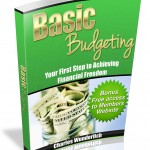Contents
How to Budget Your Money: Part 3
If you haven’t read How to Budget Your Money: Part 2, go back and read it before continuing.
Identify Your Expenses.
Now that we have covered the form and your income, let’s talk about expenses. When you add your monthly expenses to your budget, I want you to list them in the following order:
- Necessity: housing, utilities, food, fuel, clothing.
- Fixed expenses: phone, Internet, car payment, donations, retirement.
- Loans: personal loans, credit cards.
- Misc: entertainment, spending money.
I’ve listed a handful of the most common expenses, but your actually expenses might be different. This should give you a good start, however you should expect to make several changes to your budget in the first few months as you work through the numbers.
This is the most time consuming part of setting up your budget. One of the best ways to estimate your future expenses is to look at your previous expenses. Look through your bank statement, check book, and past bills to determine your spending habits and your normal monthly expenses. If you’re like me and many others, you might be surprised when you go through this exercise and find several area’s that you can reduce your monthly spending.
Planned Expenses: Emergency fund, Car, Retirement, Christmas, Vacation, etc
Most people I know live pay check to pay check, and don’t put money back for those items that seem to sneak up on us every year like vacations, Christmas, home repair, and normal car repair. These are not monthly expenses, but you need to include them in your budget. The best way to address this type of expense is to put back money each month so you don’t fall short when it comes time to pay your bills. Identify how much you need for each of these type of expenses, set that money aside, and don’t spend those funds on anything else than what they are intended for. The best way to address this is to take a little from each pay check and put in a separate account or envelope.
Let’s say for example that you currently drive a 10 year old car, you can expect that car to need new tires, and even break down. As you would expect, you don’t have to put as much money back for repairs for a newer car as you would for an older car but you need to plan for these extra expenses so that the cost don’t sneak up on. The same thing goes for vacations and Christmas. Christmas comes around at the same time every year and you can put money back for buying gifts instead of falling short at the last minute and putting Christmas on credit.
How to Handle Unexpected Expenses
Unfortunately, we can’t plan all our expenses in advance, but we can try our best to handle everything life throws our way. Life happens, and so do emergencies so we can always expect the unexpected. How we react and prepare for life’s such emergencies can be difficult.
Let’s take for example, your teenage boy barrows your sports car for the weekend, and you are now having problems when shifting gears. You take your car to your mechanic and find out that your clutch has gone out and it will cost you several hundred dollars to get it fixed. Hopefully, if you’re driving a nice sports car, you also can afford the repairs. If you can’t, you should really consider turning in your sports car for a nice family sedan.
The example above is most likely not going to happen, but other emergencies will. We always want to have an emergency fund for these types of unexpected emergencies. I’m not going to get into emergency fund’s in this section, but you can read more on this subject my article on Creating an Emergency Fund.
Continue reading How to Budget Your Money: Part 4

